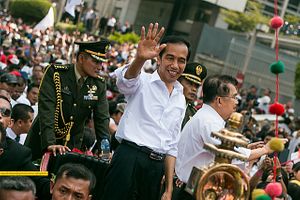Last week, Indonesian officials once again reiterated the significance of strengthening the country’s defense industry as a national priority during a press conference on the subject. The move was just the latest in a series of ongoing initiatives designed to promote awareness about the government’s efforts in this realm despite the significant challenges that remain.
As I have noted before in these pages, in recent years, Indonesia has signaled its determination to build up the country’s domestic defense industry for a whole range of reasons, from boosting its self-sufficiency to contributing to the country’s economic prosperity. Though the importance of this goal was understood before as well, it really began taking off under the tenure of former President Susilo Bambang Yudhoyono which saw important steps like a new regulation on the defense industry to help address the issue.
That pursuit of this goal has continued under Indonesian President Joko “Jokowi” Widodo. Jokowi, who as president chairs the Defense Industry Policy Committee (KKIP), has signaled a multi-pronged approach to achieving this since assuming office back in 2014, from the transfer of technology to improving the management of state-owned defense companies (See: “An Indonesian Defense Revolution Under Jokowi?”). As I have noted repeatedly in these pages, though some inroads have been made, significant challenges remain (See: “Indonesia’s Aerospace Ambitions in 2018”).
On March 3, KKIP held a press conference designed to reemphasize the significance of building up the country’s defense industry and to outline the steps currently being taken under the Jokowi government. The event was attended by several officials and experts including KKIP Chairman TNI Admiral Sumardjono.
During his remarks, Sumardjono reiterated that, broadly speaking, defense industry was an important component of building any country’s defense system, not just for its own sake but because it can have important effects on the five building blocks of defense: doctrine, strategy, posture, structure, and technology.
He also noted some progress made on defense industry under Jokowi thus far. This included not only individual attempts to better manage the domestic defense industry or individual targets, but longer-term steps such as the development of a master plan to develop it out to 2029 with various components such as fostering more international collaboration.
Though the Indonesian defense ministry’s account of Sumardjono’s remarks unsurprisingly stressed the progress made rather than the obstacles that remain, the challenges are there for all to see. Indeed, Indonesian defense officials themselves have at times touched on these challenges and the long list of measures required to fully realize the country’s true potential in this realm, including investing more in skilled manpower and improving quality and delivery times. As ever, old issues continue to remain even as new opportunities are pursued.































